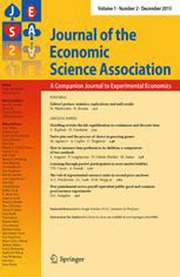Article contents
Delegated bargaining in a competitive agent market: an experimental study
Published online by Cambridge University Press: 17 January 2025
Abstract
We examine a variant of ultimatum bargaining in which principals may delegate their proposal decision to agents hired from a competitive market. Contrary to several prior studies, we find that when principals must use agents, the resulting proposals are significantly higher than when principals make proposals themselves. In reconciling our results with prior findings, we conclude that both the rejection power afforded to responders and the structure of principal-agent contracts can play significant roles in the nature of outcomes under delegated bargaining.
Keywords
Information
- Type
- Original Paper
- Information
- Copyright
- Copyright © Economic Science Association 2015
Footnotes
Electronic supplementary material The online version of this article (doi:10.1007/s40881-015-0015-1) contains supplementary material, which is available to authorized users.
We thank participants at the 2011 Economic Science Association International Meeting for helpful comments. We also thank Carnegie Mellon University, Florida State University, Olin Business School at Washington University in St. Louis, and University of Alberta for financial support.
References
- 7
- Cited by

